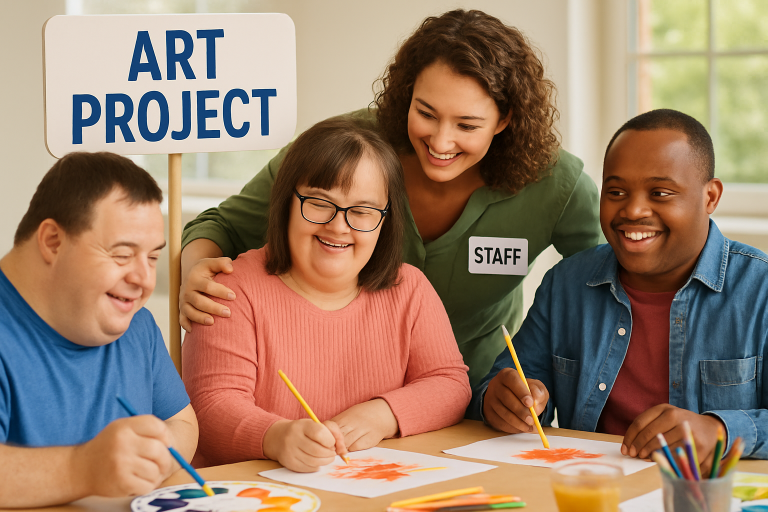Day habilitation programs are transformative environments that help adults with developmental disabilities build meaningful lives driven by skill acquisition, independence, and genuine community connection. These programs are far more than daily care; they foster growth, confidence, and opportunity—helping each individual realize their full potential. Beacon’s day program exemplifies this approach, nurturing each participant’s aspirations through compassionate, individualized support.
By focusing on both personal progression and social engagement, day habilitation bridges the gap between care and empowerment. Participants benefit not only from developing practical skills but also from forming essential social bonds within inclusive and supportive settings. These programs champion dignity and choice, providing tailored paths to independence that cater to each person’s unique abilities and dreams.
As awareness and expectations for developmental disability services rise, the field is advancing too. Programs are integrating modern technologies, fresh approaches to person-centered care, and expanded access so more adults can benefit from daily, purposeful engagement.
The impact of day habilitation is evident in every success story: adults mastering daily living tasks, gaining confidence through creative ventures, or forging new friendships. Reinforcing this are families and communities who witness first-hand the expanded possibilities for those they care about.
Personalized Support and Skill Development
A core principle of successful day habilitation lies in highly individualized programming. These programs prioritize person-centered planning—meaning every participant’s goals, strengths, and interests form the foundation for their daily experience. From creative arts and music workshops to life skills and health-focused activities, offerings are intentionally diverse and adaptive.
Staff collaborate with participants and their families to set clear objectives, such as learning to cook, traveling independently, managing finances, or developing healthy routines. This focus on autonomy helps individuals take ownership of their progress, boosting confidence and opening doors to self-advocacy. Research from The Arc demonstrates that person-centered skill development directly supports greater independence and integration in the broader community.
Building Confidence Through Achievement
Small victories—such as preparing a meal, using public transportation, or engaging in teamwork—are celebrated milestones. These moments nurture self-esteem and spark renewed ambition, proving that abilities can outshine perceived limitations when genuine support exists.
Community Integration and Social Engagement
Day habilitation extends far beyond in-house activities to emphasize robust community involvement. Program participants routinely volunteer at local food banks, assist at community events, and engage with area businesses—demonstrating the powerful role people with disabilities can play within their neighborhoods. These experiences nurture real-world social skills, meaningful friendships, and a sense of accomplishment.
Social engagement also works to challenge stereotypes and foster acceptance. When people with developmental disabilities are visible contributors in communal spaces, public perceptions shift, and authentic inclusion grows. As highlighted by coverage in The New York Times, inclusive efforts not only benefit program participants but also enrich entire communities by promoting empathy and understanding.
Technology’s Role in Enhancing Day Habilitation
Technology has become a vital asset in enhancing day habilitation experiences and outcomes. The integration of tablets, adaptive communication devices, and online platforms broadens the possibilities for connection, learning, and self-expression. Groundbreaking tools like virtual reality (VR) now enable participants to practice life skills in immersive, controlled environments—from crossing streets to handling social interactions.
Digital platforms also support collaborative learning among participants and staff, accommodating a wide variety of learning speeds and preferences. Using technology not only makes skills training more engaging, but it also equips participants with tools increasingly vital for navigating modern life, supporting transitions to greater independence.
Recent Developments in Day Habilitation Programs
The field of day habilitation is evolving to meet rising demand and expectations for inclusive, accessible care. In April 2025, Helen Keller Services for the Blind expanded its Adult Day Habilitation Program, opening new services for adults with developmental disabilities regardless of their vision status. This expansion signals a broader industry commitment to customized, equitable opportunities for all.
Meanwhile, the May Institute’s opening of a dedicated day habilitation center in Randolph, Massachusetts, in June 2025 represents another innovative effort to accommodate increasing enrollment and specialized needs. Notably, these initiatives are part of a larger national trend responding to both the growing population of adults with disabilities and the evolving understanding of best practices for care and support.
Challenges and Opportunities
Despite impressive progress, day habilitation programs face persistent challenges—chief among them is workforce shortages. According to a nationwide survey, up to 20% of staff positions in day habilitation programs remained unfilled. Recruiting and retaining passionate, qualified staff is essential for sustaining high-quality care and expanding capacity.
Nevertheless, this workforce challenge presents opportunities for growth and reimagined solutions. Enhanced training, competitive wages, and continued professional development draw talent into the field, directly improving participant outcomes. Furthermore, increasing collaboration with families, advocacy groups, and community partners creates a strong support network to address emerging needs.
Conclusion
Day habilitation programs represent a cornerstone in the journey toward greater independence, community participation, and quality of life for adults with developmental disabilities. By focusing on personalized support, authentic inclusion, and the adoption of cutting-edge technology, these programs empower individuals to define their own futures. As demand grows and methodologies advance, ongoing investment in staff, resources, and innovative best practices will ensure that the promise of day habilitation—living with purpose and dignity—remains within reach for all.
